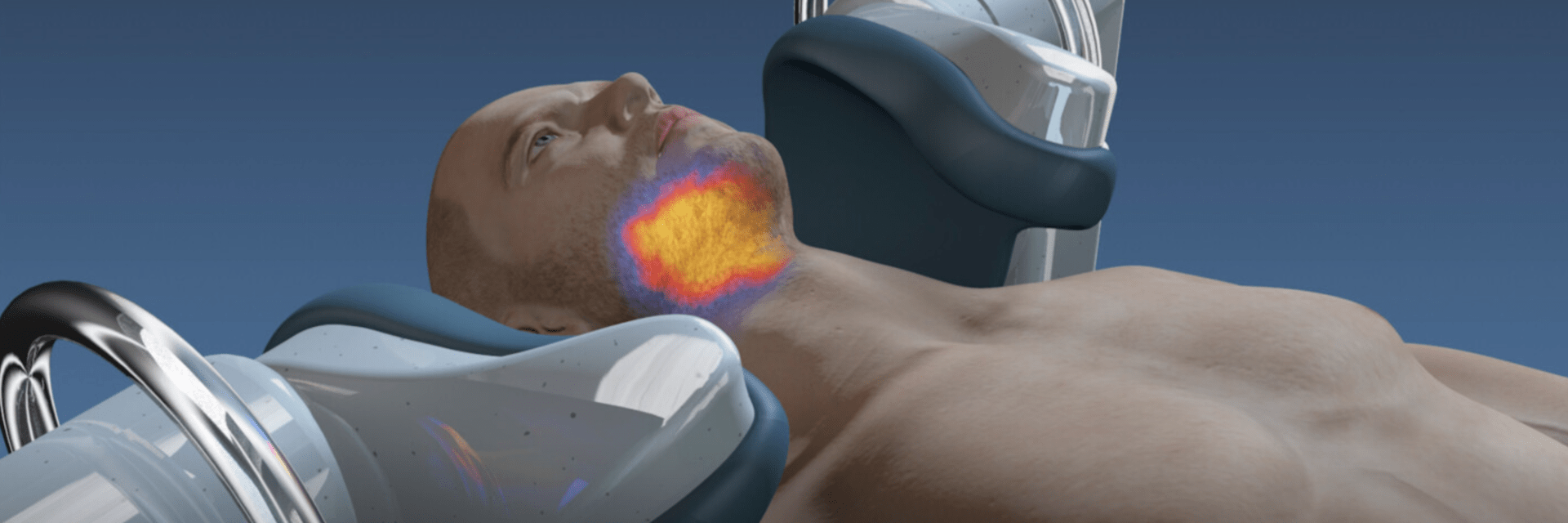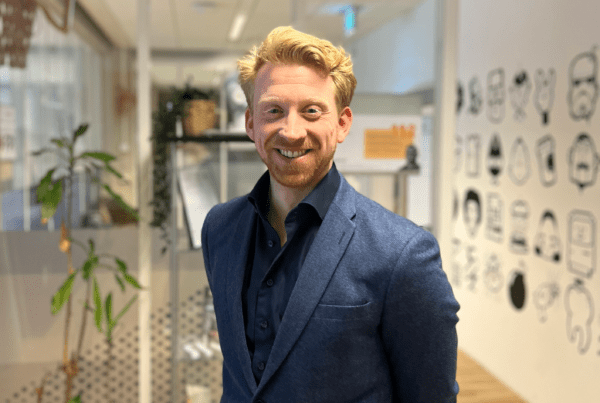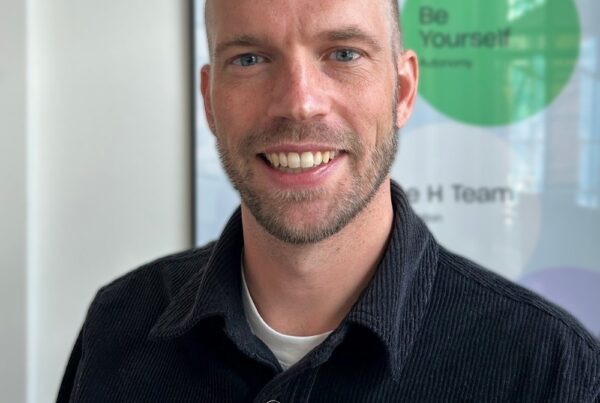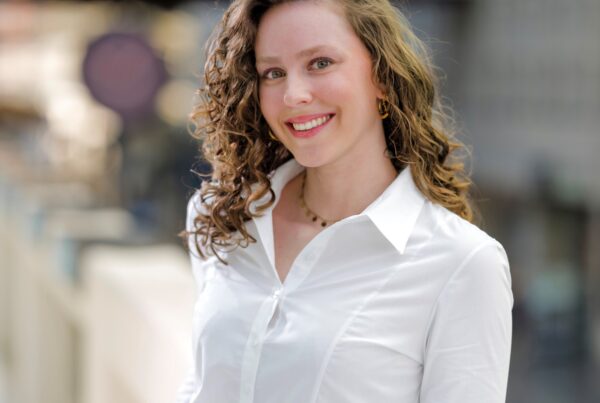Sensius can further develop unique thermotherapy thanks to European Union grant
‘This is a serious statement from the EU, we hope Dutch investors will also step in’
A greater chance of cure, a better quality of life during treatment and lower healthcare costs. Sensius’ thermotherapy is promising. The European Union, which recently invested €6.7 million in the Rotterdam-based company, sees that as well. ‘With this we can take faster steps towards the market,’ says co-founder and CEO Paul van den Biggelaar.
Paul, how happy are you with the grant from the European Innovation Council (EIC) Accelerator program?
Paul van den Biggelaar: ‘Extremely happy! It is a huge amount. Partly thanks to this grant we can take steps towards the market faster. In addition, we see this as a very serious statement from the European Union. They recognize and acknowledge that our thermotherapy has an enormous added value for the cure of head and neck cancer, the types of cancer that we primarily focus on. In our view, this recognition is also justified; the way we apply thermotherapy is absolutely unique in the world.’
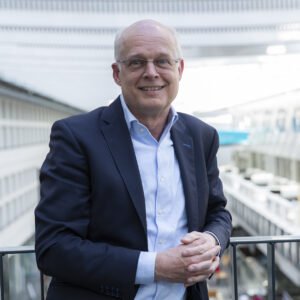 ‘Thermotherapy is the heating of a tumor to 43 degrees Celsius. It is used in combination with radiotherapy or chemotherapy. Thermotherapy has been around for more than 20 years. For a long time it was difficult to apply it in daily practice because the technology for it was lacking. Professor Gerard van Rhoon and Professor Maarten Paulides conducted research from the Erasmus MC Cancer Institute and found a way that is applicable in daily practice. Also, the results are better than before. I myself, from my background in high-tech product development, was already doing research on thermotherapy. In 2015 I met Gerard and Maarten and, together with Peter van Paassen as an experienced entrepreneur, we founded Sensius.’
‘Thermotherapy is the heating of a tumor to 43 degrees Celsius. It is used in combination with radiotherapy or chemotherapy. Thermotherapy has been around for more than 20 years. For a long time it was difficult to apply it in daily practice because the technology for it was lacking. Professor Gerard van Rhoon and Professor Maarten Paulides conducted research from the Erasmus MC Cancer Institute and found a way that is applicable in daily practice. Also, the results are better than before. I myself, from my background in high-tech product development, was already doing research on thermotherapy. In 2015 I met Gerard and Maarten and, together with Peter van Paassen as an experienced entrepreneur, we founded Sensius.’
Researchers and entrepreneurs, a golden combination!
‘An essential combination, I would say. We need each other to make healthcare innovations available to a wide audience. We started with zero resources. After we got the initial funding, we moved into the Erasmus MC Incubator in the Rotterdam Science Tower. At the time, the second prototype for patient treatment had just been commissioned; Gerard and Maarten had been developing prototypes since 2002. Our team has grown; twenty people are working on Sensius every day. We are now located in Erasmus MC itself, where the Incubator will hopefully soon be relocated. I think the arrival of Rotterdam Square is a good thing; this organization can also help us take the next step.’
What results have you already achieved?
‘More than 70 patients have already been treated with our prototypes. The results are good. In 80% of the patients, no tumor is observed twelve weeks after the treatment. A very special outcome; if you only apply radiotherapy, this is between 40 and 50%. Another important outcome is that the quality of life is much higher than with other treatments. Sometimes additional chemotherapy is applied to increase the effect of radiotherapy, but this causes greatly reduced quality of life. In addition, our therapy is cheaper for society in the long run. Because there are fewer side effects, it leads to lower healthcare costs. And because the chance of tumor recurrence is lower, people get back into the social process faster, contributing to the Netherlands. By the way, we are still in the process of substantiating this with hard data, but certainly already dare to claim this.’
Why did you choose the application in head and neck cancer?
‘Because the results of standard treatments for these cancers are very unsatisfactory. One out of two patients develops a recurrent tumor, and the average life expectancy is then only 18 months. In addition, traditional treatment involves many adverse side effects. From a technical point of view, head and neck cancers are the most difficult to treat. If successful, we can also apply it to other forms. We are already working on a study of thermotherapy in breast cancer, in collaboration with four other universities.’
What are your next steps?
‘We are now working hard to turn the latest prototype into a commercial device that meets the stringent requirements for risk management, usability and robustness. But it must also look good, comfortable and safe; for cancer patients that is very important. There is already plenty of interest from Dutch hospitals, but also from Germany, Switzerland, Austria, England and the United States. We expect to be able to deliver the first products within two and a half years. Before that happens, we will conduct additional studies together with Erasmus MC to prove the impact.’
What is the state of support and interest from Dutch investors?
‘We are currently in talks with a number of venture funds and family offices abroad. Prince Constantijn van Oranje (Special Envoy Techleap.nl, ed.) recently spoke about the opportunities that Dutch investors seem to be missing. Opportunities that foreign investors do take advantage of. As a result, beautiful new emerging companies quickly end up in foreign hands. Of course it is important to invest responsibly, but I think we check most boxes. Sensius is an entirely Dutch company and we would like to build on with Dutch investors. So I hope they dare to take a little more risk and gain confidence. The European Union has set a good example.’
Want to know more about Sensius? Click here or connect with Paul van den Biggelaar on LinkedIn.
Photographer: Margret Tielemans
Source: LSH010
Date: April 13, 2023
